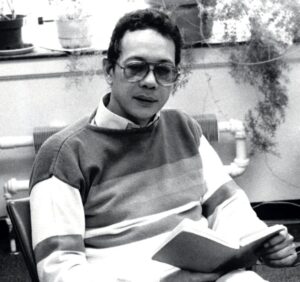Noordhoorn shared infectious enthusiasm for German language
Noordhoorn spent more than 36 years at Albion College, teaching German and chairing what is now the Modern Languages and Cultures department.
September 22, 2023
 German Professor Emeritus Max Noordhoorn died June 30. He is survived by his wife, Pat. Noordhoorn spent more than 36 years at Albion College, teaching German and chairing what is now the Modern Languages and Cultures department.
German Professor Emeritus Max Noordhoorn died June 30. He is survived by his wife, Pat. Noordhoorn spent more than 36 years at Albion College, teaching German and chairing what is now the Modern Languages and Cultures department.
Noordhoorn came to Albion in 1968, joining an old friend to serve as Albion’s German faculty. “Max and I met in the early 1960s as graduate students at the University of Michigan,” recounted Emeritus Professor Ingeborg Baumgartner, who spent all but her first two years at Albion with Noordhoorn.
Despite their preexisting friendship, Baumgartner recalled feeling “too timid to say anything” when Noordhoorn – and his cigarettes – were assigned to share her office. At the time, smoking indoors was universally accepted, and Baumgartner assumed Noordhoorn would insist on the privilege.
“To my astonishment he was not offended, stubbed out his cigarette, and promised not to smoke there again. He kept his word. And I was thankful for that,” said Baumgartner.
Baumgartner and Noordhoorn went on to a successful career as colleagues and innovative collaborators. Soon after creating and teaching a new 300-level course together, they read a professional journal article encouraging college instructors to develop similar courses. “Max and I promptly composed a description of our course, supplementing pertinent, useful material, and submitted all to the journal,” said Baumgartner. “Our essay was accepted and published in 1977.”
“He was my first German professor at Albion and he got me hooked on learning the language,” recalled Barbara Weidendorf ’83. More than 40 years later, Weidendorf remembers most of the words to the songs Noordhoorn had the students sing as part of their classwork. “Maybe the songs remained with me because I ultimately left the world of business and taught high school German for 25 years.”
Weidendorf also noted that for many years, she regularly saw Noordhoorn at International House reunions and Homecoming, when he often invited alumni to his home. This teaching and friendship “struck a chord with me that continues to resonate to this day,” she said.
“Max loved German literature and his enthusiasm for the subject was infectious,” said Steve Sedore ’96. Like Weidendorf, Sedore became a German teacher whose curriculum is still impacted by time spent with Noordhoorn.
“I teach my students (as Max taught me) how in ‘Wandrers Nachtlied II,’ Goethe masterfully places the phrase ‘hardly a breath’ at a place in the poem where the reader is coming to the end of a long line and is almost out of breath,” Sedore said. “Also, I teach them how Goethe wrote it on the wall of a mountain cabin after hiking all day. A day Max would’ve enjoyed himself—maybe with a little less hiking, though,” he concluded.
“When I first met Max Noordhoorn, I remember my surprise at seeing a tall tanned tennis player in a Hawaiian shirt, Topsider shoes and no socks. The only time I ever saw Max dressed in business casual was for dinner parties he and Pat hosted,” recalls French Professor Dianne Guenin-Lelle. “A true iconoclast, he inspired a joy in living and working at Albion that has stayed with my husband and me through all these years.”
Niko Kanagawa, ’05, lived in Germany during a semester abroad and as a Fulbright fellow for a year following graduation. He only overlapped with Noordhoorn for a year, but clearly recalled the part Noordhoorn played in his successes abroad.
“Max pushed us to become more strategic writers and thinkers in the language. He embodied the liberal arts ethos with German as the central piece,” Kanagawa explained. “It was confidence-building. Knowing how to do more than ‘fill in the blanks’ grammatically, I was gaining my voice in a foreign language and felt like I wasn’t faking it. For all of us that year, he was instrumental in refining our abilities within the language and instilling confidence in what we could accomplish.”